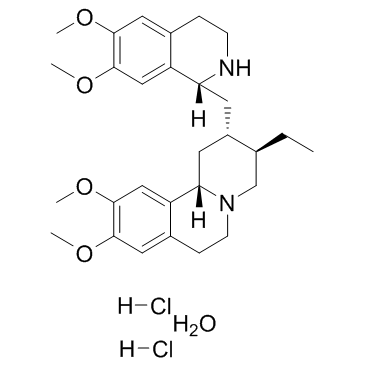Emetine dihydrochloride hydrate |
| Katalog-Nr.GC32048 |
An alkaloid with diverse biological activities
Products are for research use only. Not for human use. We do not sell to patients.

Cas No.: 7083-71-8
Sample solution is provided at 25 µL, 10mM.
Emetine dihydrochloride hydrate is an anti-protozoal drug previously used for intestinal and tissue amoebiasis.
Emetine dihydrochloride hydrate is reported to have an IC50 value of 1 nM on the drug sensitive 3D7 P. falciparum parasite strains. Dose response curves are determined for both drugs using K1 resistant isolates and IC50 values of 47±2.1 nM and 2.6±0.41 nM established for emetine dihydrochloride hydrate and DHA, respectively[1]. After the lymphoblasts are treated with cycloheximide or emetine dihydrochloride hydrate, the expression level of the mutant allele is elevated almost equally to the wild-type alleles by direct sequencing of the corresponding cDNA[2]. Emetine is identified as a lead compound with significant concentration dependent suppression of PEDF-induced TNF secretion and an IC50 of 146 nM. Emetine inhibits PEDF-mediated TNF release without affecting cell viability. Emetine binds to PEDF receptor ATGL with high-binding affinity (KD=14.3 nM)[3]. Emetine treatment reduces cell viability, induces apoptosis, promptes AML cells towards differentiation and downregulates HIF-1α[4].
Emetine (0.002, 0.02, 0.2 and 2 mg/kg) does not induce any significant difference in body weight in mice with low-dose streptozotocin model of T1D. Administration of emetine not only attenuates blood glucose levels in dose-dependent way but also induces a persistent attenuation of blood glucose levels. Daily administration of emetine dose-dependently attenuates hyperglycemic response by d 21. Consistent with this observation, administration of emetine, but not the vehicle control, results in a sustained attenuation of blood glucose levels. Emetine improves disease severity in a spontaneous model of NOD T1D[3]. Emetine (1 mg/kg) reduces both leukemia burden in an in vivo xenotransplantation mouse model and the clonogenic capacity of leukemic cells upon treatment[4].
[1]. Matthews H, et al. Drug repositioning as a route to anti-malarial drug discovery: preliminary investigation of the in vitro anti-malarial efficacy of emetine dihydrochloride hydrate. Malar J. 2013 Oct 9;12:359. [2]. Wu L, et al. PRRT2 truncated mutations lead to nonsense-mediated mRNA decay in Paroxysmal Kinesigenic Dyskinesia. Parkinsonism Relat Disord. 2014 Dec;20(12):1399-404. [3]. Hudson LK, et al. Emetine Di-HCl attenuates Type 1 diabetes mellitus in mice. Mol Med. 2016 Jun 10;22. [4]. Cornet-Masana JM, et al. Emetine induces chemosensitivity and reduces clonogenicity of acute myeloid leukemia cells. Oncotarget. 2016 Apr 26;7(17):23239-50.
Average Rating: 5 (Based on Reviews and 19 reference(s) in Google Scholar.)
GLPBIO products are for RESEARCH USE ONLY. Please make sure your review or question is research based.
Required fields are marked with *




















